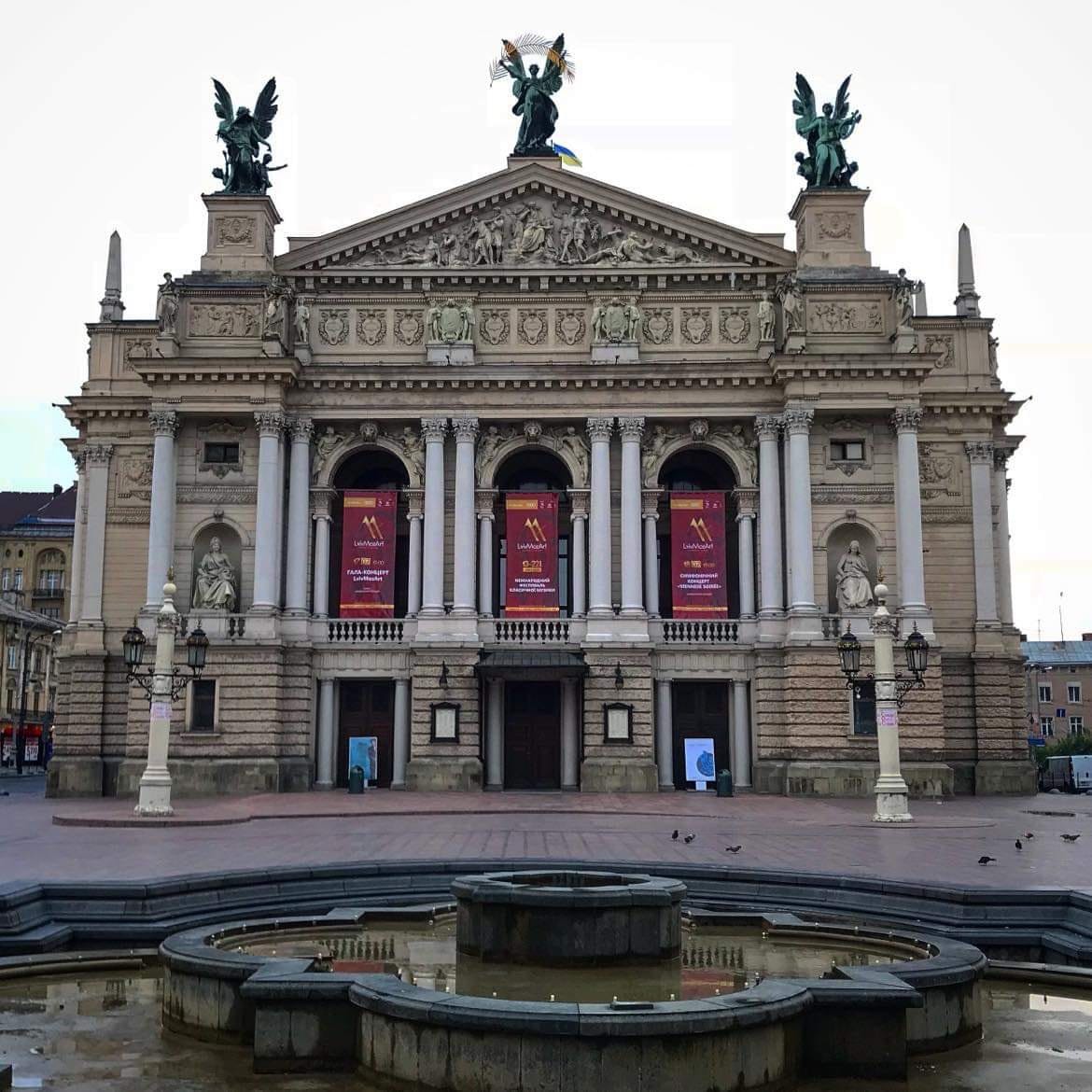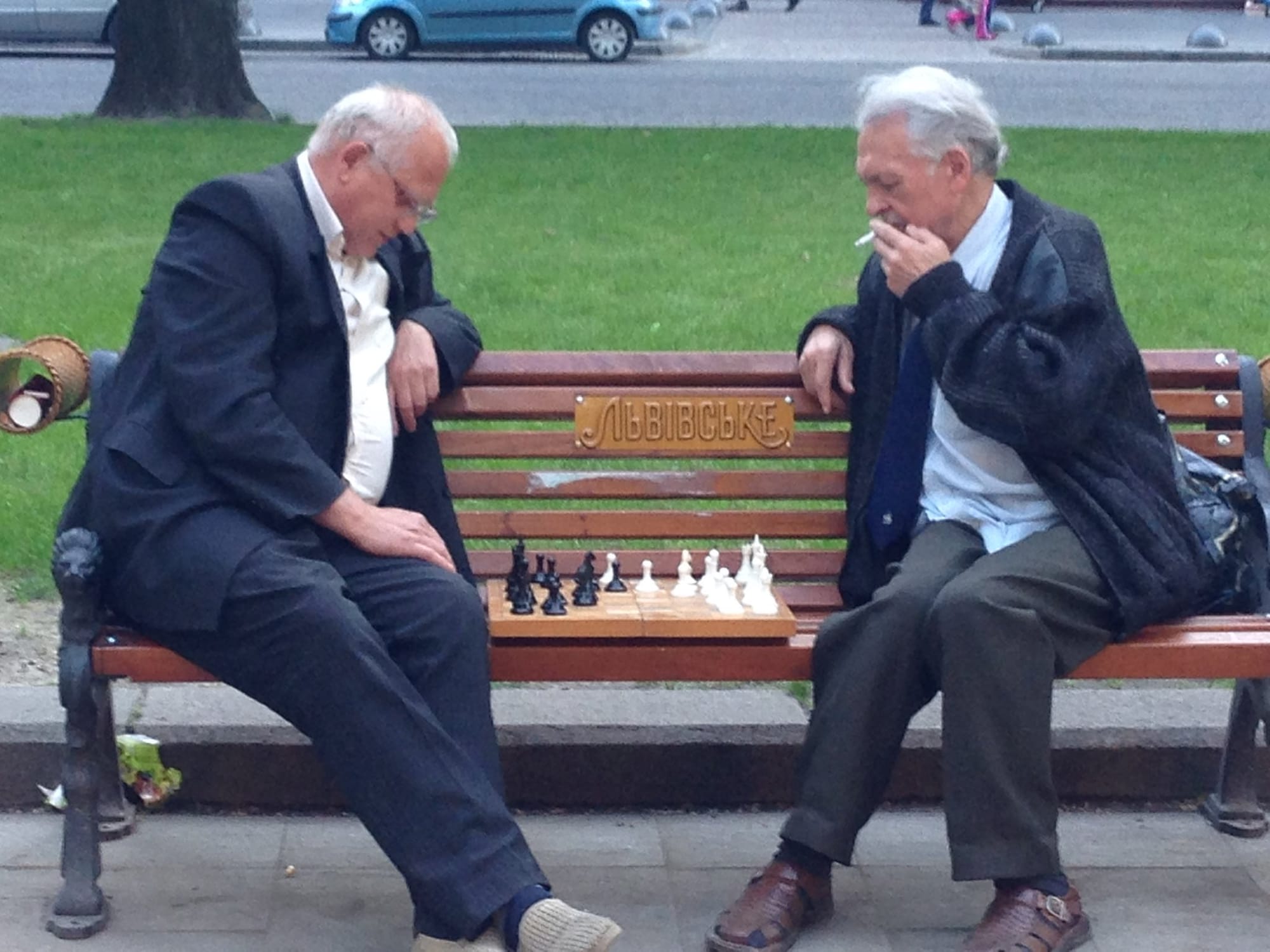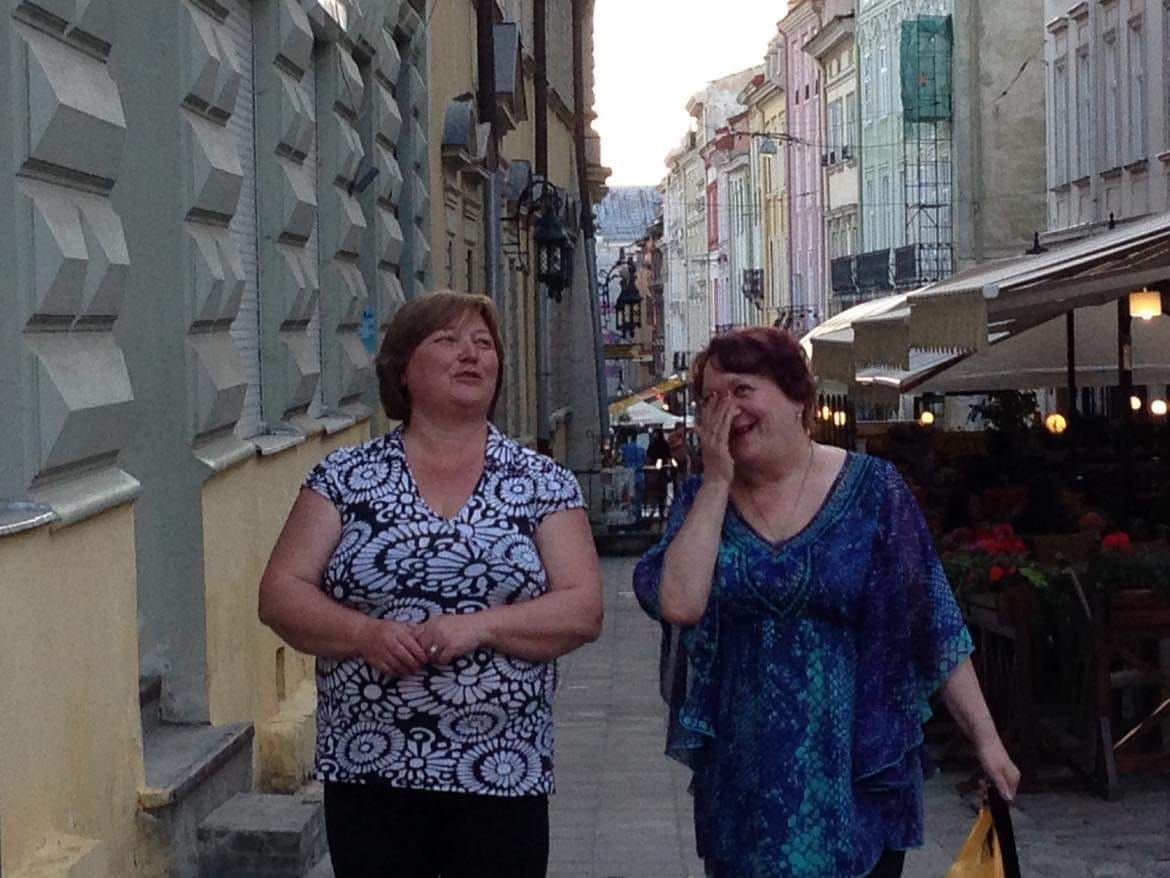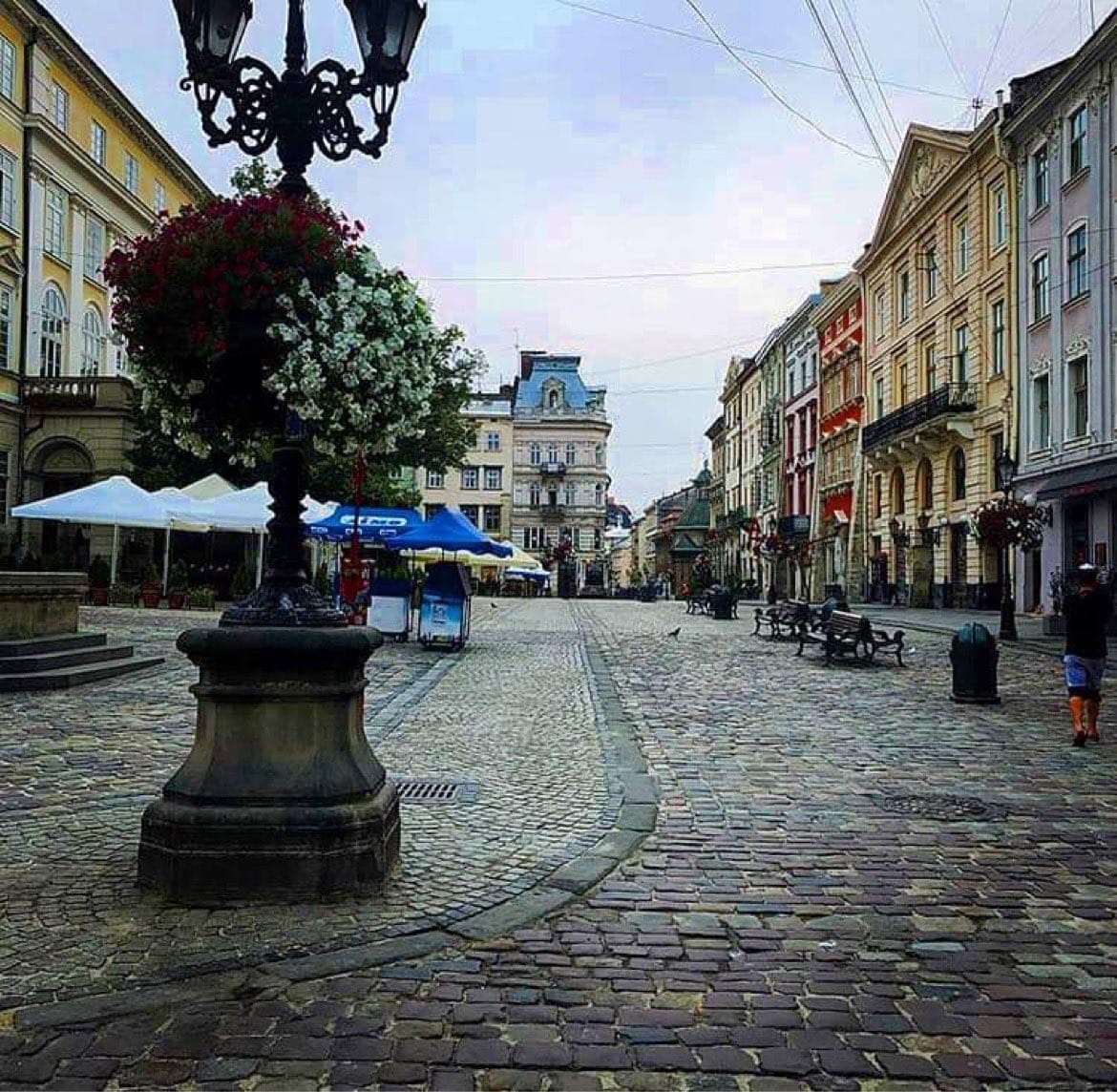This week for Strangerville I shared an audio version of the below story, published in text here for those interested in reading it.
There is a long plaza in the center of a city in far western Ukraine called L’viv. On one end of the plaza is a magnificent opera house with a perpetually dilapidated fountain out front. The opera house is adorned with Roman pillars and dramatic winged statues. The building was constructed in the late Nineteenth Century, but it looks much older.

On the other end of the plaza is a statue of Mother Mary with a plaque that says something in Polish. Mary’s palms are turned outward and her arms are barely extended forward, I suppose in grateful receipt or like she’s a choir director at the beginning of a planned crescendo. She’s performing a slight gracious bow, with her head almost imperceptibly cocked to the side, the way she is usually depicted in Catholic art. Her gesture and face communicate something of an exasperated “if you must.” The base of the statue is nearly always covered in cheap-looking wreaths, tossed there by hunchbacked Ukrainian babushkas wearing thin headscarves in muted colors. The Mary statue is sinking, I was told around 2004. Some underground waterway apparently passes just below it.
The Mary statue is hardly the only reminder of Roman Catholicism’s ubiquitous and omnipotent influence in the mediaeval town. The entire center of the city is dotted with dramatic cathedrals, several a literal stone’s throw away from one another. Church bells clank comically oblivious to one another and in no particular pattern in a deafening competition to best announce another hour has passed.
Just around the midpoint of the central plaza is a large statue of Taras Shevchenko, a 19th Century Ukrainian poet. Next to Taras there’s a sweeping memorial to the 1932 Hunger Famine that took the lives of several million people in Ukraine. The memorial is tall. It depicts countless undefined nude bodies, almost blended together and seemingly ascending to heaven.
The concrete slabs over the ground of the plaza are missing in a lot of places. Every fourth or fifth square is shattered or entirely gone. People cutting through the city center on their way to one of the many churches tend to stare down at their feet and shuffle awkwardly over the hazards as though the masses are playing a coordinated game of hopscotch.
Benches run down both sides of the plaza. Nearly every bench is headquarters for its own game of timed chess between two elderly men. A crowd of their peers, spectators, stand around each duel, their hands behind their backs, leaning down to get a better look at the action as they backseat drive every game. The men are all wearing hats and polyester coats—the same ones they probably wore forty years ago. Arguments break out from time to time in these groups. The arguments are about politics and history and the molasses-like changes in the city that probably feel abrupt to this particular crowd that defines change as abrupt. The arguments never seem to be about the chess game. If you stand near one of these groups long enough you can usually hear at least one person shout the name “Taras Shevchenko.”

The city is home to about one million people. It’s no small place, but probably not particularly well known to most Americans. It’s an old old town that has been claimed at various points by Poland, Russia, the Soviet Union, and most recently, Ukraine. It’s one of the only sizeable cities in Ukraine where very little Russian can be heard on the streets. People in L’viv are proud of that, and they consider their city to be the heart and soul of the country.
The plaza was home to me in 2003 and 2004. I spent the better part of nearly every afternoon in it for nine months trying to talk to passersby about Jesus. I lived just up the hill from the plaza, a fifteen-minute walk. My Mormon mission companion and I had a heavy wooden display depicting several religious images and an ambitious amount of text that whoever made the display apparently thought a person might stop to read. The display was about four feet across and two feet tall. We used a wobbly easel propped against a light pole to hold it up.
Because no one ever looked at it, the display was really irrelevant to what we were doing. We could have just as easily tried in vain to flag down residents without it, but I always thought I would feel naked to stand out on that plaza with no backdrop. The display provided some legitimacy to our efforts, enough so that I thought it was worth the pain of hauling it to that spot every day, rain or shine.
It wasn’t often that anyone even got close enough to the display to be able to read the fine print. Most people saw us standing there near the Hunger Famine Monument long before they reached us. I watched nearly all one million people living in L’viv veer as far as they could to the other side of the plaza to avoid me during those nine months.
There was never a single moment in which I looked forward to carrying the display to the plaza to spend an afternoon harassing people in a language I was trying very hard to learn so I could better identify the profanity directed at me. Mormon missionaries who were more zealous than me, at least according to their cheery dispositions and claims that this missionary service was their best two years, told me from time to time what a privilege it was to serve the Lord in this way. I usually agreed with them because that was easier than being a social pariah who preferred wickedness.
Truthfully, I was sincerely zealous myself to a degree that is unrecognizable to me today. Like all the Mormon missionaries I knew, I lived according to a strict code, waking up every day at 6:30 and working until well past sunset. On one occasion I accidentally slept in by thirty minutes. I spent a solid week after that worrying that God wasn’t going to help me find people to talk to about Jesus because I had done this.
Of course, that seems crazy to me today. Even in a paradigm where God is relying on an American teenager to walk through unsafe neighborhoods after dark to tell people in a language he just started learning about his religion, it’s a little antithetical to the whole scheme to cut the teenager off for making an inconsequential mistake. It’s like locking the maid out because she forgot to curtsey. Sure you may have taught her a lesson about something that didn’t matter, but the house is still a mess. Also the maid pays to clean in that scenario.
It can only be because of that worldview I even got myself to spend every afternoon on the plaza, even though I saw little-to-no-fruits to those labors.

Because of the amount of time I spent on the plaza I became pretty well acquainted with the regulars, including the chess players and hunchbacked Catholic babushkas who didn’t particularly care for what we were doing.
Then there was one row of benches closest to our display spot that had been claimed by a competing group to the chess players. These benches belonged to an unwieldy crowd of mostly young woman who hung out together there all day. There were around ten of them.
The women were rough around the edges. They were dirty, and most of them had haircuts that looked to have been self-inflicted by a dull knife. They weren’t rowdy for the most part, but fights occasionally broke out between them. I saw one of them high-kick another directly in the face one very frigid afternoon in December, not long after I had moved to L’viv. Within seconds her nose gushed blood like a faucet. The center of her face was puffy and blue for the next two weeks as she sat peacefully next to her assailant.
It was hard to tell whether any of them were in charge of the crew, but I had imagined that one older woman was their ringleader simply because she was the loudest. She looked like Lucille Ball in the late 60s, if Ball had she been poor and developed some significant mental health problems. She had red curly hair and a clown-like demeanor. I had nicknamed her Rita. She danced up and down the plaza with a whimsical open-mouthed smile. Whenever we made eye contact she winked at me.
I returned the wink on every occasion I could. This always got a huge reaction out of Rita who would gasp and grasp her heart like she had fallen in love. And then she would laugh.
A young woman caught my eye one sunny but cold December afternoon just as I was chasing down a man to see if he wanted to talk about the Holy Spirit’s influence. I noticed her, I suppose, because she didn’t fit in with the bench women, even though she seemed to have joined them. She was clean, very pretty, dressed in a mini-skirt and polished shoes. She was sitting in the middle of one of the benches, between several of the usuals. I could see they were talking to one another, although I wasn’t close enough to make out what they were saying.
I wondered how she had ended up with these other women, and guessed maybe she was related to one of them and had come for a visit, like Jackie Kennedy stopping by to see the Grey Gardens cousins.
I was naïve, so it had taken me several weeks to understand what was going on with the bench of rough women. I had seen soldiers, day after day, approach the lineup, pick one of the women out, and then retire to an underground public restroom nearby. I’m not sure what I thought was happening in that restroom when I first started noticing the routine, but I assume I just never gave it much thought. By the time this new woman showed up, I had figured out these were sex workers. I learned people in town referred to the bench where they sat as "Ladies Row."
I was surprised to see this new woman sitting on the bench for a second day. She was there the day after that, too, and every day for the next several weeks.
She befriended Rita, although reluctantly, as far as I could tell. Rita regularly tried to convince this new woman to dance with her, but the new woman usually wouldn’t deign to even stand up. After a while though, I noticed that the two started sitting together. They didn’t talk—I’m not sure I ever saw Rita talk to anyone—but they did seem to at least accept one another’s company.
There were days when Ladies Row was empty. I never knew why, but I wondered if there was some alternative location they occupied on special occasions. I missed Rita and the crew on those days, although they weren’t my only plaza acquaintances.
Sometime very early on during my stay in L’viv I was introduced to a drag queen named Mrs. Lala. Mrs. Lala was six feet tall and wore a black nest-like wig on her head. She painted her face and parts of her teeth with bright-red lipstick and her eyes with jet-black eye makeup. Mrs. Lala must have been well into her 50s. She wore black outfits and eye-catching hats and she had with her at all times signed eight-by-ten glamor shots of herself to hand out to strangers.
“I’m L’viv’s most fabulous socialite!” she shouted at me in her raspy-yet-sing-songy voice when I asked her why she was wearing hot pink sunglasses with wings on either side even though it was severely overcast that day. “If I don’t wear these I’ll be recognized and it will take me hours just to make it down the street.” I don’t know how this is possible, but in my memory although Mrs. Lala spoke Ukrainian she seemed to do so in a transatlantic accent.
Mrs. Lala made a point to stop by at least once a week to drop the latest town gossip about people I had never heard of and about events she had allegedly legitimized with her star power. She was a walking off-brand People magazine, but for a very boutique audience. I must have been that audience because I ate up every word. Mrs. Lala could tell a story, and she had a way of sharing every salacious detail with such an air of scandal that it didn’t matter that I had no context for the news of the week. I gasped in all of the right places and asked follow-up questions in an effort to coax an encore whenever I started worrying she was about to wrap up the monologue.
The point is, every second with Mrs. Lala was a gift. To this day, I still don’t know whether she was an actual town celebrity, but if she wasn’t locally treasured, the people of L’viv in 2004 didn’t deserve her.
Winter was long, dark, and cold. The sun would set in the early to mid afternoon. By springtime of 2004 when the dreary plaza began to awake for the upcoming humid summer, the latest addition had become such a regular on Ladies Row that I started to forget she was ever new. She had shaved her head around January or February in what now seems very much like a Les Misérables Fantene situation. Her face had grown puffy and swollen and her outfit, the nice one I admired the first time I saw her, now looked like rags. She had a black eye, origin unknown. She blended in so well with the others that it was hard to pick her out of the group.
Because it was warming up, young people started crowding the plaza in the early evenings, looking for entertainment, which they found in Rita. They jeered as she danced, clearly unaware she was a joke to them. On one occasion, they hollered and whistled as they watched her make out with a severely intoxicated man on one of the benches.
I had become so invested in Rita and Ladies Row by this point that the whole thing disgusted me—the way these young people were acting. We, the plaza people, weren’t there for their entertainment. We were there to play chess, and survive the soldiers, and make a buck, and hand out signed photos, and drop tacky plastic wreaths for Mother Mary, and talk about Jesus. We had put in our time and figured out how to coexist peaceably. I didn’t care for the youthful intrusion into our tragic dynamic.
By the time spring turned to summer it started to feel unproductive and too sad to camp out at the plaza in the afternoons. The crowd had grown too boisterous and loud, and Rita had fully turned her attention to her new adoring fans. Mrs. Lala wasn't even stopping by anymore, probably feeling her position was too precarious for that ever-changing world of entertainment. The chess players began to move farther and farther down the plaza until they were gone altogether.
I left the city not long after that. I was assigned to some other place in Ukraine with its own ladies row and eccentric socialites. The new people never quite felt like family the way the plaza people did. None of them had the pizazz of Mrs. Lala or the comedic timing of Rita.
A year later I visited L’viv with my parents. I was finishing my Mormon mission and getting ready to head back to the United States. My parents flew to Ukraine to spend a week touring all of the beautiful places I had been beat up or swallowed parasites.
It was late August and we walked the familiar path down the hill to the plaza so I could show them the opera house. As we went by, I glanced over at Ladies Row. A new group of women occupied the space. I had never seen any of them before. They all had sloppily buzzed heads and puffy faces and fresh black eyes. They sat sullen and quiet and huddled together, staring passed passersby who were ignoring a new set of missionaries standing in front of a display that looked worse for the wear than the last time I had seen it.
Just in front of Ladies Row a drunk man was dancing.
~It Just Gets Stranger

